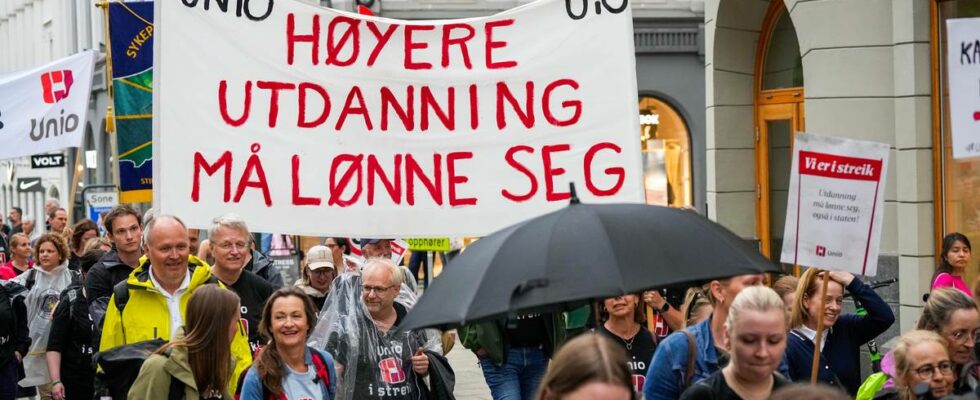LO Stat is being forced to agree to YS’s agreement, something the LO members have said no to. This is clear from the three court decisions published by the National Salary Board today. news could already experience this outcome last night. The core of the tribunal’s decision is that the Akademikerne and Unio can continue with their own collective agreement with the state, until 2026. The Akademikerne’s agreement means that the financial framework is negotiated centrally, but that the negotiations themselves take place in each individual business. Unio joined the agreement in 2022. The agreement means that wages can be used actively as a tool to attract the expertise you need locally, they believe. – The Akademikerne’s agreement is absolutely decisive for the state to be able to recruit and retain highly educated people – and thereby secure the necessary competence to deliver good services, says leader Kari Tønnessen Nordli of the Akademikerne state. Unio members also marched in the streets of Trondheim during the strike. Photo: Per Olav Alvestad / news The academics and Unio represent, among other things, police officers, teachers, researchers, doctors, nurses, lawyers, dentists and architects. The decision from the tribunal is “wise”, believes leader Guro Elisabeth Lind in Unio Stat. – If the tribunal had supported the state, it would have meant a weakening of the right to negotiate and an attack on tripartite cooperation in working life, she says. – Disappointing The decisions of the National Salary Board will be interpreted as a stinging defeat for LO Stat, which will now be forced into the agreement the members said no to in the preliminary vote. Norsk Tjenestemannslag (NTL) is the largest single union in the state and the union in LO Stat with the most state employees. NTL manager Kjersti Barsok is disappointed by the decision from the tribunal. – This was not good enough then, and it is not good enough now. We expected the tribunal to consider the members’ no and LO Stat’s claim to the tribunal, she says. – NTL has fought tooth and nail for a collective agreement that ensures all state employees pay progress, so this court decision is both surprising and disappointing, says Barsok. SKUFFA: Confederation leader Kjersti Barsok in NTL. Photo: William Jobling / news The state, as employer, wishes to return to the arrangement from before 2016, when there was one main tariff agreement for all organised. The reason is a desire for collective agreements that do not allow for more individual pay and increased pay differences. LO’s members do not want a collective agreement that is too similar to the one Unio and Akademikerne have today, and which LO members believe leaves too much of the wages for local distribution. LO believes that the result that there are now several different agreements with the state has contributed to “unequal wage development”, where the skewed distribution of the wage gap creates greater inequalities and undermined the frontline model. Leader Kari Tønnessen Nordli in Akademikerne Stat was disappointed when Labor Minister Tonje Brenna intervened with a forced wage board. Photo: Beate Oma Dahle / NTB The state has therefore not received approval for similar agreements this time. – For the state, this has always been about ensuring equal pay for equal work, regardless of where you are organised, says Minister for Digitalization and Administration Karianne Tung (Ap). – Even though the state did not get approval for one agreement this year, we have had several important victories, which I think together make it possible for us to get one agreement through negotiations between the parties, she says in a press release. Until 2026 The central point of contention between the employee organizations and the state has thus not been the contents of the revised main tariff agreements themselves, but what kind of agreement structure the employees in the state should be subject to. In the cases between the state and the Akademikerne and the state and Unio, which have been decided in the compulsory wage board, the National Salary Board has now agreed that the main tariff agreement for the period up to the next main settlement in 2026 should be similar to the agreements the state had with respectively Unio and the Akademikerne in the previous period, according to NTB. The size of the provision for local negotiations has changed in line with this year’s statement. In the case between the State and LO State, which has been decided by a voluntary wage board, the National Salary Board has agreed that the agreement between the State and YS State shall be made valid until the main settlement in two years’ time. POLICE: The academics organize, among other things, police officers. Photo: NTB This is the same agreement that LO Stat entered into with the state during the settlement, but which was rejected by the members in a preliminary vote. The decision comes after the Akademikerne and Unio took several civil servants out on strike this spring. The strike caused, among other things, trouble in getting passports, as a result of several police officers being out on strike. The government gradually intervened and called off the strike with a forced wage commission. And the National Salary Board’s decision does not just cause jubilation in that camp: it means that the Akademikerne and Unio are left with a pot of 2.7 per cent that they can negotiate locally, and not 2.9 per cent, which was the starting point. Published 19.11.2024, at 21.21 Updated 20.11.2024, at 11.38
ttn-69
The academics and Unio may retain their own collective agreement – news Norway – Overview of news from different parts of the country

